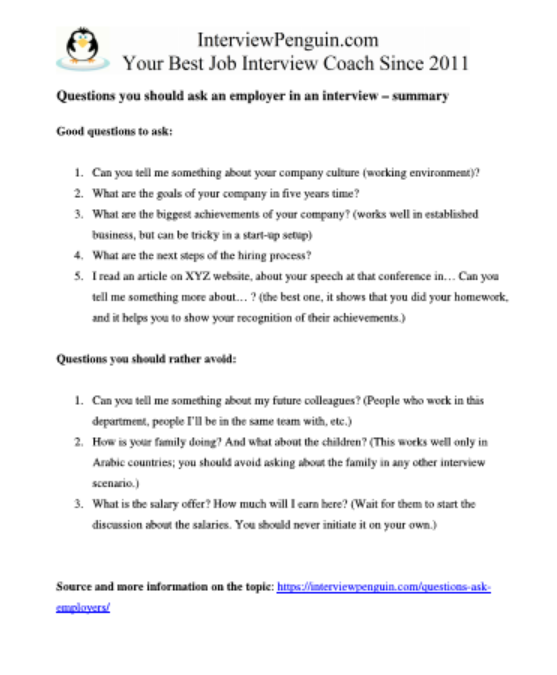Job interview is a dialogue (or at least it should be). HR managers expect you to ask some questions, and they hope that the entire meetings won’t be only about their questions, and your answers to them (or your silence when you do not really know what to say). But what are the right questions to ask in an interview? And what questions should you rather avoid, since they would make your interviewers confused? We will try to find the answers on the following lines.
Every good question you ask in an interview demonstrates your interest for the job, and for their company in general. While the basic rules of interview etiquette tells us to let the interviewers (the people from the company) lead the meeting (you should not interrupt them very often with a question), once you get a chance to ask a question, you should always do it.
We will look at eight questions right now, telling the good from the bad, and explaining why it makes sense to ask (or to avoid) each question.
Can you tell me something about your company culture (working environment, employee benefits)?
Employers are typically proud of their companies, and they like to talk about them–sometimes for too long…. If you researched about them before an interview, and understood that most employees enjoy the working environment in the company, this would be a perfect question to ask.
Asking this question you give them a chance to speak about things they like, things they are proud of. This will lead to a better atmosphere in the room–which can only help you at the end of the day.
What are the goals of your company in five years time?
Whether it makes sense to ask this question depends on the context, and the person you talk to. If you talk to an executive from the company, they will be happy to talk about their goals, and they will know a lot about them. What is more, you can elaborate on their answer, telling them how you plan to help them with achieving their goals.
If you interview in an agency, however, or with an HR generalist, the question is not good, and can actually make your interviewer feeling uncomfortable, because they will not know how to answer your question. Do not put them under pressure. Your goal is to try to make them feeling good with you…
What are the biggest achievements of your company?
If you apply for a job in a newly established corporation, or one that is struggling at the moment, you should rather avoid the question. Because they have no achievements to talk about, and firstly need you onboard to help the achieve something great.
On the other hand, if the research you did before the interview shows that their company achieved something great recently–for example prime position on the market, or winning some awards for their services, it will be a a wonderful question to ask–one of the very best questions you can use.
Can you tell me something about my future colleagues? (People who work in this department, people I’ll be in the same team with, etc.)
This is a tricky question, and you should rather avoid it, unless you are sure that you will fit in the collective (you are young, and you know that the other people in the team are also young, you come from similar background, etc).
Obviously diversity is the new buzzword, especially in the US, so if you embrace diverse team and can talk about such stuff in the interview, the question starts to make a lot of sense–regardless of the team they have in place.
How is your family doing? And what about the children?
Believe me or not, some people (especially from Arabic background) will often ask the interviewers about their family. They do it because it is a habit in Arabic countries, and it would actually be impolite to avoid the question.
In general, when we speak about Africa or Middle East, the interviews are more informal and people may talk about topics that won’t be ever discussed in a corporate interview in Europe, or in the United States.
Nothing wrong with that though–at least in my opinion. I led some interviews in Middle East, and though I found it often challenging, I enjoyed the informal talks.
When you apply for a job in Europe, Asia, or in America, however, you should definitely avoid this question. Once they hire you for the job, you will have enough time to learn more about their families, and to start friendships.
What is the salary offer? How much will I earn here?
Clever job candidates will never initiate the discussion about the salary. Wait for the interviewer to start the negotiations (or to basically tell you how much you’d earn), and avoid any questions that relate to this topic. Sometimes the questions “What is your desired salary?” may come, and sometimes it won’t. Just let it flow naturally and wait for the right moment.
Remember that if they seriously consider to hire you, they will start to talk about money. There is no reason for you to start this talk. The only outcome you can achieve with this question is making an impression that money is the only thing that matters to you. It certainly isn’t something you want to do in your interviews…
What are the next steps of the recruitment process?
This is actually a great question, and you can use it in every interview. First of all, asking about the next steps show them that you still want the job, after everything that has been said and done in an interview with them.
On the top of that, every interviewer will know the answer to this question, so you won’t make them feeling uncomfortable with it (which can happen with some other question, one they’d struggle to answer).
I read an article on XYZ website, about your speech at that conference in… Can you tell me something more about… ?
Everyone likes when other people recognize their achievements. If you can find some articles, or even blogs your interviewer has written or contributed to, check them and find something interesting.
Asking about their articles, speeches, or achievements can help you to build good relationship with them, and to win them over in the course of an interview. Needless to say, you can’t find yourself in a better position than this one.
Final thoughts, next steps
It is natural to ask questions in an interview, and you should always do it. A good research you do about the company will help you to find the right questions. What is more, you should consider their cultural background, their mood, and their position in the company. This will again help you to come up with a good question.
If you are not sure what to do, go with a question that always works–for example the question about the next steps of recruitment process.
Now that you know what to ask them, you should prepare for the questions that they will ask you. Navigate to our interview questions by job title section, choose the job you want to get, and prepare for your interview. I wish you good luck!
Matthew
May also interest you:
- How to overcome interview nerves? Struggling with anxiety in your interviews? Learn how to get rid of it for good, and show them your very best when it matters the most.
- Salary negotiation tips – Get as much as you deserve when it comes to money talk.
- How to dress for an interview – Every detail counts, including the clothes you put on. Learn how to do it right and maximize your chances of succeeding.
* You can also download an exclusive summary of this article in a simple, one page long .PDF, to continue your interview preparation anytime later, even when offline:



